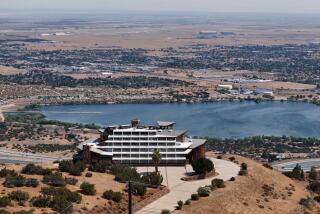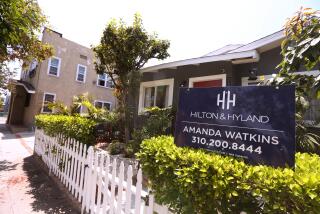A Sad Westside Story : Home Prices Have Declined as Much as 50% Since the 1980s
- Share via
Judging by appearances, Fred Meyer is a pretty shrewd fellow. He makes his living as an insurance and investment broker, advising clients where to put their money.
So it seemed like a smart move in 1990 when he bought a home on Roxbury Drive in Beverly Hills for $1.5 million at a time when housing prices were surging and Meyer had just made a minor fortune on the sale of a previous home nearby.
Then came the worst real estate downturn in memory. Even well-heeled buyers pulled the strings on their Gucci purses, and prices in the toniest parts of Los Angeles plunged like the ratings of a popular sitcom gone sour.
With his home now up for sale, Meyer figures he’ll be lucky if he loses only $300,000. “It’s not very pleasant,” he said, “but there’s not much I can do. The market has just fallen apart.”
Anyone who bought a home in Southern California since 1990 stands an excellent chance of losing money if they are now trying to sell. But, as Meyer’s case suggests, nowhere have those losses been as dramatic as the high-priced area on the Westside known as the “three Bs”--Brentwood, Bel-Air and Beverly Hills.
“Five years ago, buying a house on the Westside was like having a license to print money,” said John Karevoll, a researcher for the La Jolla-based research firm Dataquick Information Systems. “But guess what? That license has expired.”
Foreclosures in these high-income neighborhoods are now commonplace, and typical price declines are running between 35% and 50%. “There has been a blood bath on the Westside,” said Nelson Pedrozo, a researcher in UCLA’s business-forecasting group.
Not surprisingly, many real estate brokerages have been forced to slash expenses and trim their payrolls. Some--including Alvarez, Hyland & Young, a brokerage in Beverly Hills once synonymous with high-priced property--have disappeared completely.
“The last few years have been pretty painful for all of us,” said Elaine Young, who moved to Monty Gardner Realty in Beverly Hills after her partnership was dissolved earlier this year. “We’ve all had to make some sacrifices.”
Of course, sacrifice is a relative term when it comes to the rich and their real estate brokers. Young’s cutbacks? No more raffling of color televisions to lure other brokers to her open houses and fewer catered lunches.
Prudential California Realty once plied its top agents with mink coats and overseas trips. Recently, however, its top agents had to settle for a trip to the Biltmore Hotel in Santa Barbara for a few days.
Savvy investors who have amassed fortunes in real estate and entertainment have been blistered by the downturn. Among them is record mogul David Geffen, one of Hollywood’s richest figures.
Three years ago, Geffen paid a mind-boggling $47.5 million for the fully furnished Jack Warner estate in Beverly Hills. The home has probably dropped about $10 million in value since then, real estate brokers say.
“A staggeringly stupid thing to buy,” Geffen told the New York Times recently. “Do you know an Arab sheik who wants it?” (Geffen declined to be interviewed for this story.)
A 22-room house in Beverly Hills, owned by architect Michael Soumekh, was valued at $2.5 million about four years ago. Now he is trying to sell it for half that amount.
“I just try not to think about the money I’ve lost,” Soumekh said. “If I did, I’d go crazy.”
To some, the plunge in Westside real estate values is sweet comeuppance for the super-rich--a pay back for the excesses in the 1980s, such as the 56,500-square-foot chateau that producer Aaron Spelling built with a bowling alley and full-size ice rink.
But not only the super-rich have been hurt.
Local caterers say they are not putting on as many lavish events for real estate clients, while some restaurateurs miss the days when sales agents used to argue over who’d have the honor of picking up a $150 lunch tab or $300 dinner bill.
“The same realtors who used to order $145 bottles of champagne now come in and get a cafe au lait for $3.50,” sighed Freddie Kernbach, maitre d’ at the Bistro in Beverly Hills.
The tough times have brokers wistfully recalling the boom days of the late 1980s, when prices in Southern California rose more than 20% a year.
One memory of broker Fred Sands is the open house in 1989 for a new Bel-Air home listed at $9.8 million. Guests lounging on the home’s limestone terrace nibbled on hors d’oeuvres and sipped Champagne on that mild spring evening, while a white horse rented for the occasion grazed on the plush green grass on the hillside below.
“I can’t recall a more lavish open house in all my years in the business,” Sands said. “It was simply spectacular.”
On a recent Sunday afternoon, a broker holding an open house for a $1.1-million home in Beverly Hills offered visitors lemonade and cookies. Another, marketing a $700,000 home in Brentwood, offered soda pop, Ritz crackers and chunks of cheddar cheese.
Ironically, one of the early--and most visible--casualties of the real estate downturn was Mike Glickman, the San Fernando Valley broker whose attempt to expand into the upscale Westside ended in disaster and bankruptcy.
Now, Glickman has regained his footing.
He’s a broker at Jon Douglas Co., once his chief competitor, but his days of lavish spending are over. (He once spent $100,000 a year to keep fresh-cut flowers in his company’s offices and employed more than 1,600 agents.)
“Maybe I just got a little too caught up in the go-go ‘80s,” Glickman said, “but it sure was fun while it lasted.”
Bad News for 90210
The prices of single-family residences in Beverly Hills have fallen more than 50% since their peak in late 1990, while Brentwood and Bel-Air home prices have fallen by more than a third in the last three years.
Median single-family home prices in thousands of dollars
Beverly Hills (90210): April 1993: $740
Bel-Air, Brentwood (90049): April 1993: $640
Source: Dataquick Information Systems
More to Read
Inside the business of entertainment
The Wide Shot brings you news, analysis and insights on everything from streaming wars to production — and what it all means for the future.
You may occasionally receive promotional content from the Los Angeles Times.










